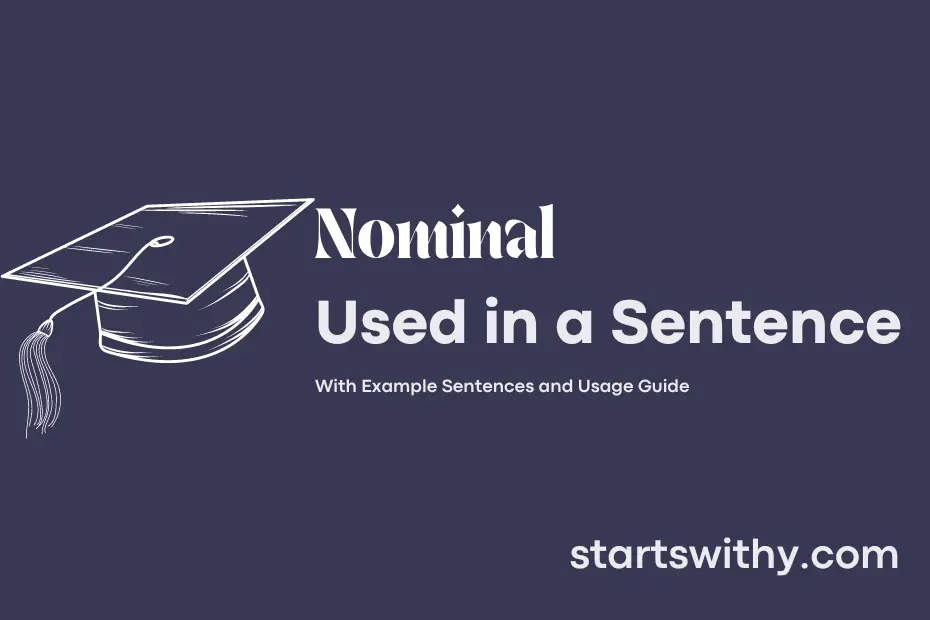Have you ever come across the term “nominal” in your reading or conversations but weren’t quite sure what it meant? In simple terms, “nominal” is used to describe something that is existing in name only, being very small in relation to the real value or importance of something, or being so small as to be negligible.
When you encounter a nominal value, it often serves as a placeholder or a formal designation rather than conveying significant substance. In various contexts, a nominal amount or fee signifies a token payment rather than a substantial one. Remember that nominal can also refer to a role or position that is titular in nature rather than carrying actual responsibilities or powers.
7 Examples Of Nominal Used In a Sentence For Kids
- I paid a nominal amount for my favorite toy.
- The cost of the snack is nominal.
- My friend gave me a nominal gift on my birthday.
- The fee for the school event was nominal.
- We bought ice cream for a nominal price.
- The school library charges a nominal fine for late returns.
- The ticket price was nominal for the school play.
14 Sentences with Nominal Examples
- Make sure to always carry some nominal cash with you in case you need to buy something quickly.
- The fee for the college event was a nominal amount to cover the expenses.
- She sold her old textbooks for a nominal price to make some extra money.
- The college canteen offers a variety of snacks at nominal prices for students.
- Students can join the photography club for a nominal membership fee.
- The local library charges a nominal fee for late book returns.
- The college gym offers nominal rates for students who want to sign up for fitness classes.
- The annual college magazine subscription fee is quite nominal compared to the content it offers.
- The college hostel provides laundry services at a nominal cost per load.
- The college bookstore sells stationery items at nominal prices for student convenience.
- The college festival tickets are available at a nominal price, so make sure to get yours early.
- Donating to the college charity fund can be done with a nominal amount that can make a big impact.
- The college bus service charges a nominal fee for students who want to use the transportation facility.
- The college cafeteria offers healthy meal options at nominal prices for students on a budget.
How To Use Nominal in Sentences?
To use Nominal in a sentence, you must first identify the main noun that you want to describe or emphasize. Once you have chosen your noun, you can then add a nominal phrase to provide more information about it. A nominal phrase typically consists of an adjective followed by the noun itself.
For example, if you want to emphasize the size of an object, you can say, “The huge elephant trumpeted loudly.” In this sentence, the word “huge” is the adjective that makes the noun “elephant” more specific and gives the reader a better sense of the object’s size.
When constructing a sentence using Nominal, it’s important to remember that the nominal phrase should directly relate to the noun it is describing. This helps to clarify the meaning of the sentence and make it easier for the reader to understand the information being conveyed.
In summary, to use Nominal effectively in a sentence, identify the main noun you want to describe, choose an appropriate adjective to enhance its meaning, and place the nominal phrase next to the noun. Practice creating sentences with Nominal to improve your writing skills and make your sentences more descriptive and engaging.
Conclusion
In conclusion, utilizing sentences with nominal subjects can provide a clear and effective way to convey information. By placing emphasis on the subject of the sentence, nominal sentences can highlight key points and make the message more direct. For instance, “The company’s success was evident from its growing profits” is a concise and impactful sentence that showcases the importance of the subject in conveying a specific message.
In writing, incorporating nominal sentences can enhance readability and ensure that the main focus is on the subject being discussed. Therefore, using sentences with nominal subjects can be a valuable tool for communication, allowing for a straightforward and focused delivery of information.



